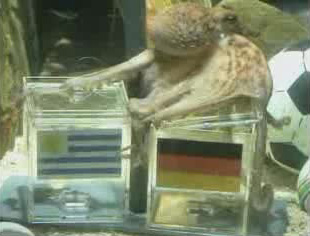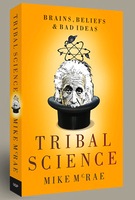With all due respect to the Spanish football team, the real winner of the 2010 World Cup is a certain German cephalopod who goes by the name of Paul. If you’ve not heard of him, you must have been lurking under the very rock he crawled out from beneath. What began as a cute parlour trick by a humble Octopus vulgaris at the Sea Life Centre in Oberhausenhas become a global sensation as Paul’s groping tentacles predicted the winner in each of the eight instances its clairvoyance was sought.

Paul knows he'll be added to a salad if he gets this one wrong
2010 was a particularly good year for Paul’s future-vision, it seems. His previous act in 2008 gave a success rate of a paltry 66 percent, correctly guessing only four of the six games. Still, an overall success rate of 86 per cent is nothing to sneeze at. Random coin flipping would mirror Paul’s most recent feat only once in every 28 (or 256) trials.
Hence it’s almost forgivable that Paul might be considered to have the gift of second sight. Almost, but not quite. For this small Chthulu-wannabe to have a brain capable of reacting to visions from the future it would require a lot of what we know about biology, physics and chemistry to be overturned. Put simply, short of using numerous variables in conjunction with a generous application of logical deduction, we have no reason to think a nervous system is capable of detecting stimuli that will occur in the future.
The fundamental philosophy of science is forbidden from stating categorically that this is impossible, of course. Yet science isn’t about possibilities. It is a probability engine, and the chance that we’ve gotten so much wrong over the past few centuries – enough for Paul to be considered an eight-limbed Nostradamus – is low enough to ignore for want of better evidence.
Surely a 1 in 256 result is convincing of something spooky, though, right? Given that we don’t have good figures on how often animals are used to make future predictions, it’s hard to say. If there have been 256 attempts at some sort of zoological precognition in recorded memory, there’s a good chance that at least one of those animals will boast Paul’s 2010 success rate at picking a winner. Most won’t come close, of course, but they’d probably be Sunday roast after their second fumbled call. So Paul’s appearance on the front page of the local tabloid makes him seem rather unique.
Still, 256 feels like a big number. Is it really conceivable that it was just pure luck?
Again, we don’t know. The system employed by the aquatic park staff was far from well controlled; given it was a bit of a lark, nobody can blame the employees at SeaLife for not drawing up a double blinded, randomised trial. However, the method of using food rewards hidden in Perspex boxes decorated with the competing countries’ flags leaves plenty of room for a non-paranormal explanation.
A quick look at five of the eight winning flags suggests Paul might a fetish for yellow. Sadly, as the zoologist JB Messenger discovered in 1977 our brainy, stomach-footed friends-of-the-sea lack colour vision. Yet there are other variations between the flags that could tantalise Paul’s aesthetic tastes, as far as stripes and shades go. Any visual preference there could nudge results one way or another.
Ever the patriot, he held a particular regard for Germany’s flag. Could he have been tempted or unintentionally guided to pick his home country?
Lastly, six of his choices were the right-hand box. One choice was from the left and the first (Australia Vs. Germany) was too early in Paul’s 2010 season to be recorded. Is it possible that position alone might have accounted as a gentle persuasion?
These questions are the reason why science uses things like controls and repeated trials. The methodology says we have to admit so long as there is room for doubt, the observation shouldn’t put our confidence in any particular conclusion. Paul was undoubtedly lucky in his pickings. Any football-mad punter would agree. But given a choice between a hypothesis that contravenes the laws of physics and one that relies on an octopus biased towards picking a strong home team several times (and a healthy dollop of coincidence), the safe bet is on the latter.
The bottom line is that that we know a lot about octopuses and a lot about our human ability to invent complex and contradictory explanations when a shrug of the shoulders is far more honest. We have no good reason to suspect that Paul’s success is due to psychic powers. From other observations, we have plenty of good reasons to know we often misunderstand probability. And for most people, that’s ok. It’s a great yarn. Fortunately it also presents us with a great opportunity to discuss some of the more fascinating aspects of probability, statistics, psychology or biology.
Sadly, this opportunity isn’t taken up by many. The author of this ABC news story titled ‘Expert won’t rule out Octopus Paul’s psychic ability’ chose to confuse ‘pragmatic doubt’ (the natural scepticism that exists in science which says all conclusions must leave room for the possibility of evidence) with ‘practical doubt’ (actively viewing alternative possibilities as being potentially useful). It’s true that the octopus expert wouldn’t rule out ‘psychic powers’. I’d go one step further – he can’t rule it out, especially if he was a scientist worth his salt. Given he’s a scientist, he’d refrain from ruling anything out; not out of an unwillingness to commit to an idea but because that’s fundamentally how science works.
The expert in the story goes on to confess to being sceptical about Paul’s psychic prowess, disinclined to present himself as being controversial. Fair enough, I guess. Considering the relatively tiny percentage of readers who’d feel embarrassed on behalf of the author for their lack of science literacy, it’s also easy to sympathise with why the author chose a sensationalised headline over accurate reporting.
Paul has now retired, so it’s unlikely he’ll be challenging his own record for the next World Cup. But given our propensity to indulge in stories of magic and make believe over the non-committal philosophy of science, I can guarantee Paul won’t be the last ‘psychic’ animal to grace the headlines.
More information




